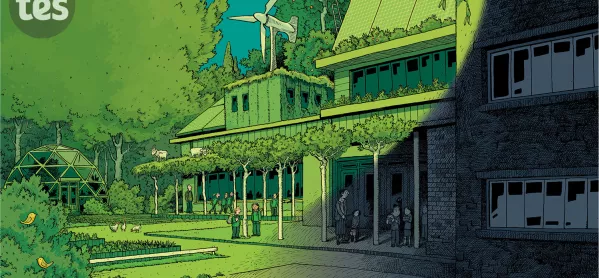- Home
- Teaching & Learning
- General
- Why climate change is at the heart of our curriculum
Why climate change is at the heart of our curriculum

We should all welcome the way in which colleges are committing to the Climate Action Roadmap.
At the South Central Institute of Technology (SCIoT) we’ve identified curriculum as the area where we can make the deepest and longest-lasting impact on climate change.
It’s hardly surprising that the world’s attention has been diverted from the environment to the pandemic in the past year. Everyone is affected: of the 15 nations claiming to have had no cases of Covid, almost all are tiny remote island clusters in the Atlantic or Pacific oceans. It’s also to be expected during such a time of universal peril that the other great threat to our world, climate change, is being largely ignored. But the thing is, the two are inextricably linked.
Tes magazine: Are FE colleges doing enough on climate change?
More: Labour’s John McDonnell urges students to act on climate change
Opinion: How to make your curriculum eco-friendly
An article published back in August in the scientific journal Nature explains why. The snappily titled article “Zoonotic host diversity increases in human-dominated ecosystems” demonstrates that the more we cut down the rainforests, the more we will see pandemics like the one we’re experiencing now. Put simply, when you clear the forests, the top-level predators are the first and worst affected species. Kill off the killers and you allow the bats and rats to flourish, giving them greater capacity to pass viruses to us. In other words, if we keep on the way we’re going, we will see more pandemics and more frequently.
Which begs the question: if environmental change impacts every facet of human life from health to food production to industrial output to our very survival, why aren’t we teaching about it more? Why is there not a sustainability module of some kind incorporated into every course of study we offer?
Climate change affects every part of our lives
It was with this in mind that we at the SCIoT produced, in association with Pearson, a new level 5 module - digital sustainability. The module will allow students to explore the whole range of unforeseen sustainability challenges associated with digitalisation, based around mineral resource, ethical working and employment practices, economic impact, supply chain challenges and climate change, among others.
During the pandemic, we’ve felt pretty good about the aspect of working from home, which has meant we haven’t been driving our cars to college or to meetings - and that’s great. However, it’s a mistake to think that tapping away, as I am doing now, has no environmental impact.
A study commissioned by energy company OVO and released in 2019 looked at what it describes as unnecessary emails, primarily those that are one or two-word responses - “thanks” or “will do”. It estimated that Britons alone sent more than 64 million of these per day, and that was in a non-pandemic year. The carbon produced by the infinitesimal quantities of electricity that these consume is equivalent to the emissions from 81,152 flights from London to Madrid or the annual pollution from 3,334 diesel cars.
Sustainability is a multidisciplinary challenge, and technologists of the future will have to work with a whole range of other stakeholders, including engineers, scientists, governments and financiers, if they are to be able to make a difference. Hence, collaboration with others is a key element of the module.
There is no escaping the challenges that we face. At the SCIoT, we’re currently getting on with plans for our three campuses in Bletchley, Oxford and Reading. We’re working to embrace sustainable design and operational principles, so our facilities are energy-efficient and long-lasting. Our emerging designs include decarbonised heating systems, photovoltaic panels, clever use of natural light and smart building management systems.
Climate change affects every part of our lives and every part of our lives affect climate change. With commitments like the government’s net-zero target for 2050, it feels like we’re on the cusp of potential change for the better. If we, as educators, are to play our part, it has a place in every part of our curriculum, too.
Alex Warner is the principal of the South Central Institute of Technology
Register with Tes and you can read two free articles every month plus you'll have access to our range of award-winning newsletters.
Keep reading with our special offer!
You’ve reached your limit of free articles this month.
- Unlimited access to all Tes magazine content
- Save your favourite articles and gift them to your colleagues
- Exclusive subscriber-only stories
- Over 200,000 archived articles
- Unlimited access to all Tes magazine content
- Save your favourite articles and gift them to your colleagues
- Exclusive subscriber-only stories
- Over 200,000 archived articles
topics in this article



